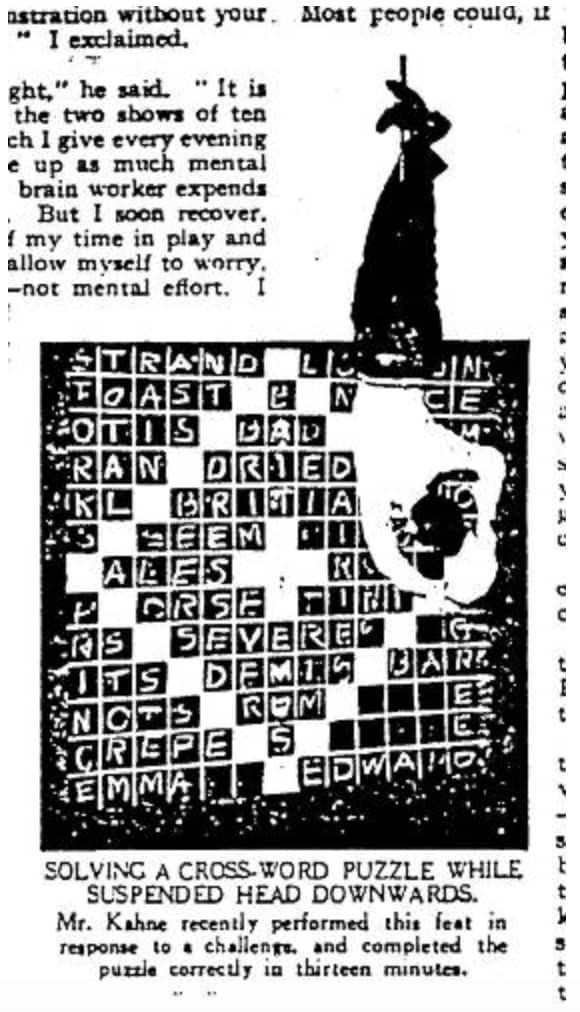Podcast: Download
Subscribe: Apple Podcasts | RSS
 How would your life improve if you could perform six mental operations at the same time?
How would your life improve if you could perform six mental operations at the same time?
Do you think it would help you tap into more of your brain power?
Harry Kahne certainly did.
And he proved it many times, often by writing out quotes from books in both hands while talking to his audience about other topics.
The strangest part?
He claimed his mind was perfectly average. He told thousands of people around the world that anyone could perform multiple operations at the same time.
I agree, and here is why:
I’ve been practicing exercises from Harry Kahne’s Multiple Mentality Course for years. Although I can’t perform many of his impressive students, here are a few benefits I’ve experienced along the way:
- Sharper thinking
- More free time
- Improved numeracy
- Better memory
- Useful mental connections
- Enhanced abilities with memory techniques.
Of course, I’m not practicing these techniques to deliver stunt performances… the odd time I might recite the alphabet backwards while juggling:
The real reason I perform demonstrations is to aid my research into how to use memory techniques better. I’m also constantly crafting new brain exercises so others can experience mental sharpness that lasts.
Why?
For one thing, there’s a lot of warnings out there against multitasking out there – most of them very good.

But when it comes to using mnemonic devices to memorize, say, all the names in a packed room, we definitely need to multitask in our minds.
Directing multiple mentality at our use of memory techniques seems to me the finest possible use.
So let’s dive deeper into who Harry Kahne was and what multiple mentality is all about.
Who Was Harry Kahne?
Harry Kahne proved that multitasking is indeed possible.
He demonstrated this by performing demonstrations where he would write upside down with one hand, backwards with the other, all while reciting poetry.

Or, he might solve complex calculations with his feet while speaking to his audience as his hands wrote out newspaper headlines from memory.
Born in 1894, Kahne said that he started practicing multiple mentality during school. His teachers kept catching him daydreaming, so he devised a way to read his school books and daydream at the same time.
Clever!

By the time the 1920s rolled around, Kahne was touring as The Incomparable Mentalist.
I don’t know if Harry Loryane ever saw Kahne demonstrate his skills, but certainly these kinds of performances were common on the vaudeville circuit at that time. These days, Kahne’s work looks more like what we see from mentalist Derren Brown.
To help other people learn how to perform several operations at once, he explained how others can practice the same “mental gymnastics” he used to develop his skills.
Multiple Mentality Course Review
Hopping into a time machine to attend a live lecture with Kahne is sadly not possible (yet).
But we can find a PDF or webpage version of his teaching, and it is incredibly helpful.
Here’s what you’ll learn:
One: Why People Fail To Exercise Their Minds
Kahne feels that schools focus more on socializing individuals than it teaches them to think. He also points to modern comforts as a source of weakening the mind, citing earlier survival requirements as being essential to better thinking.
Although I think Kahne is right that needing to hunt, farm, build shelter and raise a family without the luxuries of contemporary medicine required more thinking, I don’t quite agree.
For one thing, those skills have very little to do with writing poetry in reverse with your hands while verbally solving math problems.
Also, we have the problem that the very reason we have so many luxuries comes from masses of people who have developed improved thinking skills. Kahne’s historical fallacy in this regard suggests that his objective reasoning might not have been as improved by multiple mentality as he claims.
Nonetheless, Kahne is correct that all of us need “warming up” when it comes to using our mental abilities better. In fact, this point shows up in creativity studies.

For example, Dr. Robert Epstein is a leading authority on creativity. In numerous articles, many gathered in his book, Cognition, Creativity, and Behavior, Epstein shows how a quick warmup improves creativity, focus and attention while engaged in more complex tasks.
This is why I like to quickly memorize a deck of cards or juggle while reciting the alphabet backwards before sitting down to do any writing or language learning.
Two: Alphabet Exercises
Kahne explains that these are the most important aspects of his training. Having practiced them myself, I can see why.
First, he asks you to write out the alphabet backwards… from memory. Unfortunately, he doesn’t teach you how to memorize it in reverse order, and gives the bad advice that you should write it out 50 times to learn it.
That’s too much work! So to reduce all of that unnecessary repetition, I teach you how to memorize it backwards in the Magnetic Memory Method Masterclass.
In addition to working with the alphabet in reverse order, Kahne asks you to:
- Pair the alphabet’s extreme ends by mentally reciting them, i.e. A-Z, B-Y, C-X, etc.
- Start at the center of the alphabet and pair them in reverse order
I would also suggest that you learn the number of each alphabet letter. You can rapidly do this by using the pegword method and a Memory Palace.
Three: Writing and Verbal Exercises
Starting with 3-letter words, Kahne asks you to write one word while spelling another out loud.
For example, as you write S-K-Y to spell “sky,” you would spell pen, i.e. P-E-N.
It’s actually trickier than it seems – give it a try!
Next, work on writing one word forwards while verbally spelling it backwards. Then, write a different word backwards while verbally spelling it forward.
From there, move on to 4-letter words and beyond.

For an additional challenge, try visualizing something completely different. For example, as you’re spelling “tree” and writing “cart,” imagine a tent.
Four: Write Words From Memory
Kahne asks you to find forty words and write them on paper.
Then he asks you to crumple the paper up and write all those words again on a fresh piece of paper.
I think he’s quite misguided in asking you to repeat this 25 times or more. You could just learn how to memorize vocabulary and get the list correct the first time.
For a great word generator, I suggest the IAM memory training website. It generates words, numbers and other memory competition-related material for you. It also lets you test your results.
Or you can just grab a deck of cards and memorize those.

Five: Recite Poetry While Writing Your Name And Address
Now we’re talking!
Although Kahne gives no instructions on how to memorize poetry, this is a great exercise.
As Kahne points out, however, your address is going to be rather easy.
To increase the difficulty, recite a poem while writing out the address of a friend.
Six: Word Recombination
Next, Kahne suggests that you take the 4-letter words you memorized and start recombining them.
For example, if you memorized fish and cart, you would spell something like “fictrash.”
Or, if you intermingle them in order, it would be one letter from each word interleaved:
F-C-I-A-S-R-H-T
It’s actually REALLY hard to do correctly, and typing presents a different kind of challenge. You can think of it as the mental version of preparing your fishing line.

Kahne suggests you spend 20 minutes daily on intermingling the letters of words.
The only change to this exercise I would suggest is that you quickly do this after memorizing vocabulary from the IAM lists. And I’m not convinced you need to spend quite so much time on the exercise. Probably 5 minutes will do.
Seven: Intermingle Entire Texts
There are many more exercises in the Multiple Mentality Course. I’d be robbing you of the opportunity to discover them for yourself when you read it.
But to skip to the kingpin of them all, imagine memorizing three verbatim texts, say a poem, a speech and a list of 3-digit numbers.
As you recite the memorized speech, you write the poem with your left hand and the digits with your right hand.
How will you get there?
Practice with just writing first.
For example, write the first word of the speech, then the first word of the poem, then the first string of digits. Carry on from there, alternating as you go through all three pieces of information, unit by unit.
Will Multiple Mentality Really Help You?
Ultimately, I cannot say.
But practicing these skills has been noticeably beneficial to me because I suffer from brain fog if I don’t get enough mental exercise.
Plus, I have so much chronic pain to deal with, I need the mental strength these activities bring in order to cope.
And all the more so, given that I myself have to memorize speeches and deliver them well.
Even if some of the ways I use these exercises are not as elaborate as Harry Kahne’s demonstrations, given all the challenges I face, I need all the mental robustness I can get. And these activities deliver.

The real reason I think these exercises work is simple:
- They promote cognitive switching, which is known to help people establish mental flexibility
- They improve memory because you are exercising it
- They expand hand-eye coordination because you are writing in challenging ways
- They exercise verbal memory because you are reciting information in a novel format
Beyond that, they get you working with information in ways we’re not used to doing. This simple “out of your comfort zone” stretching provides mental dexterity we wouldn’t have otherwise.
And if you think about it, the other ways of developing such skills of the mind are very similar:
Reading a lot, drawing from your memory frequently, combining ideas in different ways.
Those things are draining, however.
That’s why using Kahne’s exercises as warmups has helped me do all the things I do, both in memory and running this site. Think about how many years I’ve been juggling the MMM Podcast, Blog, YouTube channel and the courses – talk about multitasking!
All that said, here are my main concerns:
Kahne’s social criticisms are obviously not correct. It’s also strange to me that Kahne doesn’t teach mnemonics.
But that’s okay. It gives me the opportunity to fill in the gap through a free course I invite you to sign up for now.
When you add memory techniques to the exercises we’ve talked about today, I’m sure you’ll find all of Kahne’s exercises beneficial.
In fact, I’m not sure I would have been able to use ars combinatoria without having practiced them first. And that skill has been very beneficial to me indeed.
What other mental exercises do you know that exercise multiple mentality?
Related Posts
- Defending Memory Expert Harry Lorayne And Dominic O'Brien
Memory expert Harry Lorayne is a master of modern memorization techniques. Learn why.
- Harry Lorayne Memory Improvement And The Magic Of Mnemonics
You probably know the name of memory improvement expert Harry Lorayne. But do you know…









52 Responses
Playing the piano or organ and singing simultaneously…
Is that an example of multiple mentality?
I think it’s certainly in that general realm.
I just finished exercise 2….. honestly, it was hell towards the end. Like it was easy to remember the 50 words, but it got real monotonous having to do all that writing.
Anyway, there are 4 drills mentioned afterwards. The first one involves writing down a three letter word, and then thinking out aloud another one that is completely different.
He starts out by saying “try this in your spare time”. Now that makes it seem like this is optional.
So is this optional or should I do these 4 drills? Must I do them or go to lesson 3?
Never mind, I just read exercise 3, and it Said that I must do the 3 letter word exercise for a week before going to exercise 3 (in order to be able to do it automatically).
So with that being said, I will do exactly that, but those 4 drills…. must I still do those?
The answer depends on your goals.
Thanks, Aman, and great that you’re completing the exercises.
Looked at one way, it’s all optional.
What are your specific goals?
I’m not really sure what my goals are. I’ve never seen exercises like this before…. So I’m following them very strictly.
But man, it sucks doing so much writing. As of now I went from 50 words, to 61 words and now I’m currently trying 100 words.
The only thing, putting these in alphabetical order was making it too easy….. I honestly never felt right the first 2 times.
Even now with the 100 word attempt, I’m jumbling up the words and not putting them in columns of words starting with A,b,c etc
But even then, I predict that I will remember them by the start of the letters and just put down A,b,c,d and then the words come to me like lightning.
Also constantly coming up with new words it tough.
Anyway, if it helps….. I would say a goal for me is better concentration though.
Improving concentration is a great goal.
One way to improve it is to reduce thoughts about the effort. These bring little or nothing.
The next time you find yourself thinking it “sucks,” give this technique for reducing negative thoughts a try.
Practice it for 90 days, and I’m confident you’ll find your quality of mind and concentration has greatly improved.
Ok Thank you. This is the first time that I actually read this article, and I saw that you say repeating something 25 times is too much work and not needed.
But yeah, considering concentration is a goal, I will keep doing the repetition (is that ok with you? Or do you advise against all that repitition).
Also Thank you for the 90 day suggestion.
Great.
Keep in mind that the 90 days suggestion isn’t coming from nowhere.
Many studies show this is a bare minimum for experiencing habit formation and the basis for meaningful change that lasts.
Hello, just thought I’d give you this quick update. In like 3 days I’m going to move on from exercise 2 to either exercise 3 or the 4 additional drills in exercise 2.
For exercise 2, I would get really tired with it, as I knew the words, but instead of repeating them regularly, I did them backwards. This was an instant wake up. I also felt mentally stronger after doing So several times.
The words are very easy to remember now, both forward and backwards. So tonight I’ll finish off the 25 rewrites of these last batch of 99 words (currently on 23).
Anyway, Harry Kahne instructs one to stick to exercise 2 for 1 whole week before moving on. The purpose is to see 3 letter words as one whole thing instead of 3 letters individually.
He has the additional 4 drills involving spelling a word and writing a different one
You would be happy to know that I unconsciously stumbled on this already (when writing a word in reverse, I just said aloud the word regularly even though I spelt it backwards and all).
But yeah, in 3 days I’ll either move on to exercise 3 or the 4 additional drills.
Great – enjoy the journey!
The real rewards will come when you start applying all of this to your use of memory techniques, especially in a well-formed Memory Palace Network.
Evening….. regarding these 3 additional drills…. I figured that since I finished rewriting the letters 25 times, I might as well try drill A.
First of all, I was mistaken, it was drill A,B and C (so 3 drills, not 4)
And secondly, I was basically doing drill b when writing the words in reverse all those times.
Evening. I have finally started with exercise 3. Now it’s 4 letter words, and I started with 50 like harry kahne says.
I am looking forward to the additional drills too. Drill A involves a poetry passage…. should be interesting.
Anyway, exercise 3 is going good, I have all 50 words memorized and I’m on my 6th write…. 19 more to rewrites to go.
Great progress!
Thank you. I finished writing the 4 letter words 25 times.
Drill A,b and c involve memorizing a poem, writing your personal details while reading this poem out aloud from memory etc.
Now this time round they don’t suggest doing this 4 letter exercise for a week like with exercise 2 (I read the instructions for exercise 4, and it just suggests doing all previous exercises to basically stay sharp, including the transposing of letters and all….. which is easy).
This time it’s implied to just do these previous exercises to stay sharp or something….. at least that’s how I see it.
So do you suggest I go to the poem drills, or stay with the rewrites of 4 letter words?
If you do think I should stay with the 4 letter words still, I understand….. but how long do you suggest I stay with it then?
Also, please know this is not me shooting line or anything…. If you want me to stick with this exercise longer, I understand.
It’s just I don’t want to do anything wrong either (staying too long on an exercise when you yourself would potentially want me to just move forward (if you want that that is).
Anyway, for today I will keep writing more rewrites in reverse now, until you give your input.
Anyway, enjoy your day
Memorize the poem first, then complete the drill.
I’d suggest going further too.
Memorize lots of poems and work out other kinds of additional details to write out.
There’s a suggested exercise in my video on “Memory Palace Habits.” Please search it up on YouTube for this powerful suggestion.
Ok Thank You, will do. Drill A involves memorizing the passage, drill b is say the said passage out loud while writing your personal details like address, and still c is recite any poem while writing your friends details down.
I think now I’m starting to get into the meat and potatoes of this thing.
Let the games begin!
Hello, I’m doing the poetry drills, but I’ve bumped into kind of a problem.
What happens when you recite the poem aloud, faster then you write your initials and personal details?
I’m finding my self recite the lines quicker then my details being written, as the first line in the passage has only 6 words (the night has a thousand eyes), the second has 4 (the day but one), the third has eight words (yet the light of a whole life dies), and the fourth line also has 4 words (when love is done).
Is it ok if you finish reciting the line before finishing writing your name, surname, address etc?
I’m writing the details easily, but I feel that finishing one line gives me a pause that I’m not sure if its unfair or not.
Let’s add an additional powerful exercise for you:
What metrics could you create for yourself to answer this question?
What happens if it’s not okay with respect to your goal?
What happens if it is?
Answer these questions and report back to us.
Well, from all my rewrites I did catch that regardless of speed, memory is memory.
If you can remember something easily, you can do so at any speed really….. since you know it (which is what counts I guess).
So I slow down when reciting the poem. I wrote my address and names 50+ times, now I’m doing So with my friends.
Very good answer!
Thank you
My pleasure!
Hello, hope you are well. Regarding the drills, I have done writing my friends address while saying aloud the poem given in Harry kahne’s Manual, the our father who arth in heaven prayer, and the ring a ring a Rosie song.
How many more must I do before I move to exercise 4? How many poems do you recommend I do before I move on?
I’m very well, thank you.
The number of poems is up to you. How well do you want to master these techniques?
Mastery = constant practice.
Conceivably, the answer is as many poems as you can over the years to come.
Why stop?
Well,after working through this course for a few weeks, I think I know now that I want mental strength (my overall goal from this course). Harry kahne himself even says that one is getting mentally stronger after each exercise.
With that being said, the thing is, it takes me about 5-6 rewrites to master the said poem while writing known addresses.
So I take that as low-medium difficulty for exercise 3 and its drills (more so towards the low difficulty tbh).
Now I’m not going ahead or anything, it’s just when I read exercise 3, it Said in its instructions that one must do exercise 2 for a whole week before proceeding to exercise 3.
On the other hand, when I read exercise 4 to quickly see if Harry kahne instructs one to do exercise 3 for a week too, I saw nothing of the sort.
Even the additional drills involving writing addresses while saying poetry aloud….. there’s no mention of doing it for a week (no specific time is mentioned regarding how long one must spend on it).
That’s why I was asking how long you would suggest I spend on exercise 3?
For me personally, exercise 3 is a bit tricky, but a bit easy though.
Exercise 4 I see myself having trouble with it (medium difficulty)…… it’s either the exercise 4 drills or exercise 5 which involves numbers that I see myself finding tough (can’t remember, but I saw numbers the further on I read).
Yeah, my main goal is mental strength. So I’m hoping to find a difficult exercise soon.
If you want a difficult exercise, try memorizing pi to 100,000 digits (or more). Then write out poems by hand while writing out pi accurately from memory under scientific conditions. That should be significantly difficult enough, no? 😉
Is this exercise in the manual?
Anyway, I’m going to do exercise 4 today. This exercise involves taking two 3 letter words and mixing them together. Sounds fun.
As for the exercise you gave me, where in the manual is it? It definitely sounds hard.
It’s not in the manual.
If you’re only going to stick to the Kahne course, then I humbly submit that the point of the course has been missed. It should be reviewed thoroughly and work should be done to realize that fullness of possible exercises in the world.
Question for you:
What about the Multiple Mentality Course fascinates you so much?
Ok Thank you for the response. What fascinates me about harry kahne’s work is the concentration it gives you. And thus my main goal from it is mental strength.
I mean, I respect you thinking that I missed the point tbh, as I’m following this stuff a chapter at a time, and whereas you suggested that I fully review the entire manual…… I am only reading a chapter at a time and sticking to the exercises in it…. and then proceeding to the next and stopping there to finish, and so on and so on till I reach the end.
From your experience, how do you think I’m going wrong? If I personally critique myself, I may be too rigid, solely following the manual only, but honestly, I’m a flat out beginner in this stuff….
Yes, the concentration benefits are great. I recommend adding Memory Palace work and meditation, ideally memory-based meditation with some movement involved.
I do not have any opinion on where you are going wrong. These are matters to discuss only during private consultations.
Ok I understand, Thank You. Regarding exercise 4….. it’s tricky…. I’ll tell you that much.
I’ll let you know in the coming days how it’s going.
Enjoy your evening
Tricky was what you were after, no? 😉
Yeah 🙏
Harry even says that this is the first complex exercise (or something along those lines).
Going to add this exercise to my arsenal of fire power.
Hello….. just a quick update…. the exercises are all easy now. Harry Kahne basically says that from memory, one must write two 3 letter words, a four letter word and a three letter word, and two four letter words, together….. in 1 and 1, 2 and 2, 3 and 3 order (example, come+bear=cboemaer)
And basically, one must get to the point where writing this is Like writing a regular word.
I got that now.
Are there any other videos of harry kahne? The only one I’ve seen as I mentioned in the e-mail….. was basically the short 3 minute one where he writes on the chalk board.
As I said, it is kind of cool if there isn’t, as it’s like here we have this mental master that only one surviving video of him exists. It’s like a relic.
Do You know of any other videos of him? Particularly the one where he hangs upside down? Everything I find otherwise is always in French with no subs or captions sadly
If there is other footage of Kahne, I am not aware of it.
Hello, here to give you my updates on exercise 5 and 6, Particularly exercise 6.
First of all, they are both easy. Especially with this 6th one, it was simple right off the gate. My observation is that when you have the words memorized, that’s the massive bulk of the work done. After that you write it all down in the order instructed (exercise 5 being writing two 4 & 5 letter words laced together with one in correct order and the other in reverse like bars+cars=bsarrasc).
It’s slow at first due to thinking of the words, but the words come to you, and then writing them in that order is whatever…….After like 4-5 rewrites you can write it really fast anyway.
However, I must be honest though, this has to be due to putting the words in alphabetical order, which I got from your work in the memory palace course.
Now the thing is, whereas karry kahne literally says in chapter 6 that his work avoids you from needing mneumomic devices (hoping he never made the same mistake that the art of memory author did)…… you literally state that the memory palace is good for your natural memory.
So with these exercises, let’s say I stop putting words in alphabetical order (which makes remembering them too easy), to make it more difficult and all, will this give me bad habits for when I do eventually get around working on your memory palace sheets? As again, while putting words in alphabetical order is making this stuff a cake walk, that’s a page off of your memory palace stuff…. which is overall an aid to natural memory rather then an artificial tool.
With exercise 6 I don’t think it will be hard though even without me writing it in order, as come on, you must only write like 6 words.
Thanks for your update.
I think the only danger of developing bad habits is not having a goal for these exercises. I’m not sure how it can be possible for one brain exercise to in any way endanger the Memory Palace technique.
YOU see, the thing is the memory palace works in such a manner that the way you place things you try to remember in various rooms (like treasure chests) results in one remembering them long term. It is thus natural.
Now for Harry kahne, WE don’t know how he would respond to one using memory palace techniques on his stuff, unless I’m missing something as I’m only half way in his stuff anyway. But from what he said in chapter 6, the way he mentions how one doesn’t need mneumonic devices, as you naturally remember (he said something along those lines)……. I don’t know man, THAT came across to me like he is adverse to techniques or treats them as artificial like the art of memory author.
And yeah, with this being said, what I’m trying to get at is that
A) I’m not sure if I’m allowed to put things in alphabetical order or not, as that is making it really easy in doing these exercises
B) with this being said, if I drop this and just write say 100 words (not in order anything) and try to raw power memorize it…. Yeah sure, I’ll probably get good at that eventually….
But then I finish Harry kaynes course, proceed to yours, which encourages one to write a list of several things, put it in alphabetical order…. and walk that journey down in various rooms.
Obviously from this I will find it impractical to not first thing assort my list in alphabetical order…… It’s one of the most fundamental steps that results in going to your natural memory. If I some day retry the Harry kahne course again, why wouldn’t I first thing write my list like that…. It would be impractical otherwise.
So I don’t know, I hope I didn’t just find an impracticality in this manual.
Actually, it’s all impractical. Remember Shaw’s famous quote:
“The reasonable man adapts himself to the world; the unreasonable one persists in trying to adapt the world to himself. Therefore all progress depends on the unreasonable man.”
OK Thank you for that quote.
Anyway, according to Kahne, these exercises are more to train your brain in such a manner that you just anticipate things different.
He equates crossing words together and mastering that ability…… to thus once mastering it, now having a mind that can in the same manner, connect ideas together.
But anyway, I might not post much as I will be moving on to exercise 7 and if I find it too simple, I will keep going till I find a road block. Then I’ll let you know.
Anyway, see you then. Enjoy your day.
I will close this off though by saying with certainty that from exercise 1-6, memorizing the words is the massive bulk of the work done…. It’s not hard.
When you say it’s not hard, can you now write two different texts at the same time with both hands while reciting another text from memory?
Hello, hope you are well.
At this point I now can do up to chapter 10 of Harry Kahne’s work, I still remember the one memory palace I did, and I can memorize 1 deck of cards.
If I were to give my review on all these things, I’d say the memory palace+cards comes out on top as my favourite.
The reason these two are my favourite is because it gives you intuition. And for me personally, it’s a big milestone because I know what intuition finally feels like (so thus the sense of security is created for real rather then “fake it till you make it”).
According to Harry Kahne himself, intuition is “getting something instantly” (paraphrasing that quote).
The memory palace and cards does just that…… and for most, they never know what that experience feels Like either (remembering something instantly).
So this is thus how the mind works.
Anyway, I’ve been on a man hunt on your channel and attacked these exercises Like a madman!
Am I missing anything? I did like 90% of Kahnes manual and memorized a full deck of cards with successful recall even hours later.
I am aware that the mindmaps are a thing too, but I need to get some coloured ink pens for that.
But any thing else I’m missing?
Great update and thanks for keeping us posted here.
Mindmapping is another great skill to have. I’d get started with the principles that don’t involve multiple colors until you can get some.
In terms of “missing” things, the path of the memory master is always incomplete – and in a very positive and useful way. If you need more context on why this will always be so, please learn, study and mentally adopt the exponential consequences of the Gödel incompleteness theorem.
Gödel incompleteness theorem? Sounds interesting…. Will try tomorrow.
As for the mind mapping, I’ll give that a shot too.
Thankyou
Hofstadter’s Gödel Escher Bach is must-reading on this topic and developing it as a mental model of your own.
Hello….. just a quick update
I decided to make my return to Harry kahne today.
This time with my goal decided (finally), in that I want to be able to dual wield two pens while reciting poetry and whatnot.
I started redoing the exercises with my left hand. Was very tough, but I WILL get it mastered!!
One thing you will be happy with though, is when I wrote the letters transposed….. I applied some memory palace work.
Az became the late body builder Azziz (RIP 🙏)
The rest was
By- nothing, just think of the regular word
Cx- no image yet
Dw- no image yet
Ev- I think there’s a pokemon… but for now nothing
F_- don’t want to say it here, but john cena’s old finisher moves name
Gt- dragon ball gt
Hs- Hms system from beyblade
Ir- IRS (I think he was a wwf wrestler)
Jq- no image
Kp- no image
Lo- life orientation (old school subject)
Mn- no image
Anyway, the left hand writing is tough…… this will take months probably…. but when I master it, will let you know.
Great progress!